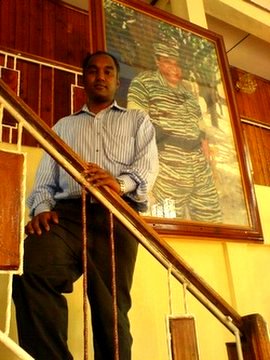.jpg)
Child marriages are common across more than a half a dozen states in India. Girls below the age of 18 married off for various reasons. Some parents says they do it because they are poor, others say tradition.
There is no major government study on the number of child brides in India. The 2001 census figures indicate that there are over 300,000 girls below the age of 15 who are already mothers.
It is illegal to marry girls below the age of 18.
For most of these girls marriage often means the end of their childhood, and the beginning of a life where they are expected to do tough house hold work for over 12 hours a day.
Most don't attend school after they get married and some have to contend with physical and sexual abuse and risky pregnancies.
But a bunch of girls in the Ranga Reddy district are leading a silent revolution. With the help of NGOs, these girls ( some as young as 13) are getting their marriages annulled by the village panchayats and reclaiming their lives.
Most of the 13 girls I met at this School do not get any support from their parents.
" I was told one day that my uncle was getting married and that we were going to his house. But my parents took me to another uncle's house. His son was dressed like a groom and I was told that I was the bride. I ran away. But my parents and other relatives soon caught me. They tied me up and held me down and the rituals were performed." 13 year old Jagamma told me.
"After the rituals were over late at night they untied me and allowed me to go to the toilet. I took my chance and ran away again. This time I ran straight to the police station. I knew my marriage was against the law. At first the policemen did not register a case, but I came back the next day with a lawyer from the NGO's office."
Her parents were arrested and have now disowned her.
" My father said, you go and start living with your husband and don't press charges. He said he would kill himself if I did not do so. I told him to die. I wanted to study and become someone. I did not want to be what my parents were forcing me to be." she adds.
Jagamma wants to be a lawyer.
Her friend at the residential school run by the NGO is 13 year old Venkatamma. Her impoverished mother married her off, because the grooms side offered to pay for the wedding.
" When I went to my husband's house they started beating me up and made me do all the house hold work. When I ran away and went to my mothers house, they threatened my mother. I then came to this school and now do not want to go back. I know that only education can help me. I want to study and become a teacher."
.jpg)

.jpg)
.jpg)


.jpg)
.jpg)
.jpg)
.jpg)
.jpg)
.jpg)
.jpg)
.jpg)
.jpg)
.jpg)
.jpg)
.jpg)
.jpg)
.jpg)
.jpg)
.jpg)
.jpg)
.jpg)
.jpg)
.jpg)
.jpg)
.jpg)
.jpg)


.jpg)
.jpg)
.jpg)
.jpg)
.jpg)
.jpg)
.jpg)
.jpg)
.jpg)
.jpg)
.jpg)
.jpg)
.jpg)
.jpg)
.jpg)
.jpg)
.jpg)
.jpg)
.jpg)
.jpg)
.jpg)

